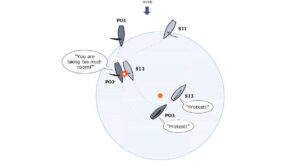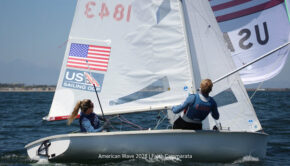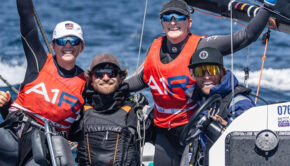Filling the void left by US Sailing
Published on March 20th, 2025
The 2028 Olympic Games are in the USA, which presents a massive opportunity for the nation. While a successful US Olympic Sailing Program is a priority for new President Henry Brauer, execution remains a question. Dean Brenner, who led the program for the 2008 and 2012 Games, shares his thoughts in this essay:
I was pleased to hear the news of the launch of Project Podium, led by America One Racing, Sailing Foundation of New York, The Schoonmaker Foundation, American Magic, and Oakcliff Sailing. This is a significant development for the top Olympic Sailing athletes in our country. The support is significant, targeted, and long overdue.
Project Podium was constructed by a strong group of business leaders and sailors who understand what is required for success. And the organizations behind Project Podium have come together to form a powerful partnership that our sport desperately needs if we are going to return to relevance in the world of Olympic Sailing.
These nine athletes will be fully funded through the next Games, including modest salaries, so that they can eliminate all distractions and fully focus on being the best sailors they can be.
Without this level of support, the 18–24-year-old athletes – who tend to make up our program – have a massive uphill battle, unless of course they come from significant wealth and can afford to fund a program themselves. Project Podium levels that part of the playing field.
The world of Olympic Sailing has continued to change dramatically, in several key ways, over the last 15-20 years. It has always been a tough game. But as with all highly competitive arenas, the bar keeps getting raised. In Olympic sailing, the need for a hyper-focused effort has done nothing but increase.
Success requires resources, of course — money, time, equipment, personnel. That’s always been true. But success also now requires a deep, dedicated focus on the most important tasks, day in and day out, week after week, month after month, year after year. Any energy spent on anything not related to Olympic success is a waste, a distraction, and ultimately a road block.
Success requires intense focus and a relentless elimination of distractions. The people behind Project Podium understand this, and have followed a model that exists in other US Olympic sports, as well as in other countries.
Unfortunately, the leaders of US Sailing have not noticed these changes and don’t seem to understand what is required. Because if they did, there would not be a need for Project Podium.
These organizations behind Project Podium should be the key partners for US Sailing… and several of them used to be. But instead, these former partners have chosen to create their own targeted effort, with the bare minimum of involvement from US Sailing.
I have been talking and writing about the need for a highly targeted program almost continuously since I stepped down after the 2012 Games… I wrote about it in my exit memo to the US Sailing Board, in multiple memos to several US Sailing presidents and board members, and in two previous Scuttlebutt essays – Root Problem for US Olympic Sailing (Feb 25, 2023) and Your Move, US Sailing (Feb 22, 2024).
US Sailing is a small, underfunded National Governing Body (NGB), that manages a highly fragmented sport with many sub-cultures. Just spend a few minutes looking through the massive menus on the US Sailing website, and you will see my point.
If an NGB like US Sailing is going to lead a successful Olympic Sailing effort, it must partition off the Olympic effort from all the other stuff US Sailing does. This has been my primary point in everything I have said and written about US Sailing over the last fifteen years.
Despite repeated pleas and suggested blueprints from many stakeholders to create MORE of a partition, US Sailing has done the exact opposite. In 2016, the sitting US Sailing President disbanded the Olympic Sailing Committee, and eliminated any partition between Olympic Sailing and the rest of the NGB.
There is no longer any independence, and all power to run the program rests with a rotating Board of volunteers who get elected for a variety of reasons, and almost none of whom have a single relevant credential to run a professional sports effort. The net effect has been repeated staff implosions, plummeting fundraising, and a ridiculously ill-advised lawsuit against a former partner organization.
When I was elected to run US Olympic Sailing in November 2004, I inherited a group of sailing leaders as my initial Olympic Sailing Committee (the late Bob Billingham, 1988 Silver Medalist in the Soling, was exhibit A of the kind of people who made up that OSC.)
This group, which I added to over time, gave us institutional knowledge, credibility, and rational decision making. We reported to the Board of Directors, but we led the program. The partition wasn’t perfect. But it worked.
Despite a poor performance at the London 2012 Games, the program at that time was incredibly healthy in terms of sponsorship, fundraising, credibility, and on-the-water success (between 2009 and 2012, our team medaled in 25% of the class world championships, drastically exceeding the number of combined medals earned from 2013 until today.)
We had a long list of sponsors and partners, which included ironically enough America One, Sailing Foundation of New York, Oakcliff, and many others.
All of that is gone now… no partition, no institutional knowledge, no credibility, and no sustained success on the water. The same partners who once formed the backbone of our program have now decided they can no longer trust US Sailing and have gone out on their own with Project Podium.
I am excited for these nine athletes, and grateful to the leaders of Project Podium. And I hope someone at US Sailing takes a hard look in the mirror and asks how we got here. Because the leaders of the organizations that used to stand shoulder to shoulder with you now have chosen to do this without you.
Good boards have the willingness to look in the mirror and realize when they have chosen a bad path. Bad boards continue to believe their own version of reality, and keep doubling and tripling down on bad strategy. It remains to be seen whether this US Sailing board will have the courage to realize that they have been on a terrible path for the last ten years.
Respectfully,
Dean M. Brenner
Wallingford, CT
Above photo: The 1984 US Olympic Team came away with three Golds and four Silvers at the LA 1984 Olympics. Every American sailor won a medal, breaking an Olympic record previously held by the Norwegians in 1920.
Dean has been directly involved with the US Olympic Sailing Program, in many capacities, since 1995. He finished 2nd at the 2000 Trials with Ed Baird and Tom Burnham in the Soling Class; was a member of the Olympic Sailing Committee for the 2004 games; was Chairman and Team Leader for the 2008 and 2012 Games; and was an occasional, behind-the-scenes advisor for the 2016 Games. He sat on the Board of Directors for US Sailing from 2000-2012, and helped run the Sailing Foundation of New York, a major donor to Olympic Sailing, for nearly a decade.
Los Angeles 2028 Olympic Sailing Program*:
Men’s One Person Dinghy – ILCA 7
Women’s One Person Dinghy – ILCA 6
Mixed Two Person Dinghy – 470
Men’s Skiff – 49er
Women’s Skiff – 49erFX
Men’s Kiteboard – Formula Kite Class
Women’s Kiteboard – Formula Kite Class
Men’s Windsurfing – iQFOiL
Women’s Windsurfing – iQFOiL
Mixed Multihull – Nacra 17
Venue: Los Angeles or Long Beach
Dates: July 21-August 6
* World Sailing voted to keep the Paris 2024 Sailing Program for Los Angeles 2028, but the program is not final until the IOC approves all events, which usually occurs between December 2024 and January 2025. To date, this decision has not been made.









 We’ll keep your information safe.
We’ll keep your information safe.